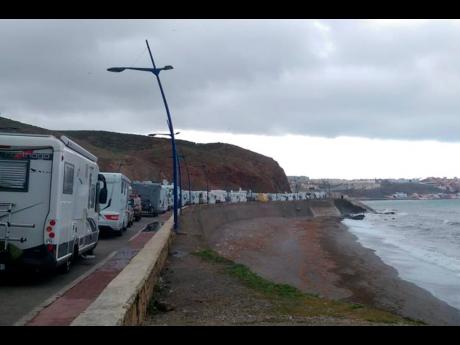Hundreds of tourists stranded in Moroccan lockdown
RABAT, Morocco (AP):
Hundreds of tourists, who were travelling in Morocco in motor homes, have found themselves stranded in a parking lot near a Tangier highway that authorities have turned into a makeshift quarantine centre.
The mostly British tourists were told by Moroccan authorities reacting to the coronavirus outbreak that they were no longer allowed to wait at the Moroccan side of the Spanish enclave of Ceuta in the hope of being allowed entry into Spain. Ceuta is just over 20 kilometres across the sea from Gibraltar, which is British.
Moroccan authorities are in the process of equipping the parking lot with electricity and essential accommodation. They are also building temporary food shops as the tourists settle in and prepare to stay, potentially in quarantine throughout the coronavirus lockdown of unknown length.
“We were told we’ll have to stay here indefinitely,” said British traveller, Lynda Dransfield. “It’s just a daunting prospect not knowing when we’ll be able to leave.”
Dransfield said that the park has running water, communal showers and toilets, but she fears contamination from using them. Morocco has identified 225 cases of COVID-19.
Like hundreds of tourists, Dransfield and her family drove more than 16 hours on Saturday from a camping site in southern Morocco to Spain’s Ceuta border when they were told by the British embassy that the border would open for them to pass.
vans lining up
She arrived on Saturday night to find hundreds of vans queuing in line. “We were waiting with more than 650 other motor homes for three days without access to bathrooms and without news of what will happen to us.”
Another British tourist, Andrew McKettrick, said people were panicking. He said most of the travellers were elderly, and there were also many children.
“As soon as we arrived at the queue after driving 16 hours, the ambassador told us to go back where we came from,” he said.

